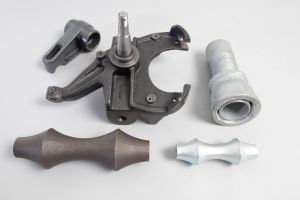any products - any design - any compliance - any industry
small - medium - high quantities
Metal Casting

MiMfactories provides services for custom Metal Casting. We offer sand casting, precision casting, and die casting methods. No matter what casting method your project requires, our factories consistently deliver high quality cast metal products that meet or exceed expectations.
Metal casting occurs when molten metal is poured, or injected into a custom-made mold. After the metal cools and hardens the finalized metal part shape is then ready to be finished. This can be accomplished through additional machining, and other processing techniques that are used to achieve desired tolerances and finishes.
Metal Casting Specification
| Item Name | Stamping parts |
| Size | As per approval product drawings |
| Thickness | 0.5mm~15mm |
| Material | Carbon Steel, Alloy Steel, Stainless Steel, Aluminium Alloy, Cooper and other metal sheets as per requirement |
| Application | Household Hardware Products |
| Surface Treatment | Self color, Polishing, Painting, Powder Coating, Electrophoretic Coating, Anodizing, Nickel Plating, Zinc Plating, Hot dip Galvanizing etc. |
| Quality Control | 1. Test raw materials, sizes, chemical composition and mechanical property;
2. Random inspection during production processing; 3. Final production size test, with measurement tools, special gauges and Coordinate instrument if needed; 4. Assembly and Function test, with special testing gauges; 5. Packing test |
| Packing | Plastic bags, Cartons, Racks, Plywood Cases etc. |
| Logistics | Shipping, Air Flight, International Express etc. |
| Processes available | Cutting, Bending, Blanking, Punching, Deep Drawing, Hot Punching, Drilling Tapping, Rivetting, Welding, Machining, Polishing, Plating etc. |
| Certificate | ISO 9001 |
| Service | Custom OEM/ODM metal parts processing, Whole Product assembly, 2D 3D drawings design, International Delivery Logistics, Serivce before after sales etc. |
There are several different methods that are available for casting a part. The most popular methods include, die, sand, and investment casting. Each method uses a slightly different process but delivers the same results. The casting method used depends on the metal or alloy being cast, and the dimensions and geometry of the part design, among other factors.
Because molten metal flows much like a liquid, and can completely fill all areas of an intricate mold shape, metal casting is the preferred process for creating complex metal parts. Metal casting is also far better suited for making parts that require internal cavities. There is essentially no upper or lower size limit for cast parts, making it the ideal method for small to very large parts.
Metal Casting Advantages
Metal casting is not always the preferred method for creating parts, some of the disadvantages include:
- Accepts higher tolerances for more detailed part designs
- Creates closer to net-shape parts that require less secondary machining/processing
- Nearly always lighter than otherwise-identical forged parts
- Easier and less time-consuming modification of part designs and accompanying molds
Metal Casting Disadvantages
Metal casting is not always the preferred method for creating parts, some of the disadvantages include:
- Often exhibit more surface porosity than forged parts and may contain unintentional voids
- Not as tough as forged parts (cannot withstand as much pressure or frequency of impact)
- Requires more operator monitoring and interaction to maintain quality and prevent defects
Small - medium - high order quantity
Product materials of cast iron, cast steel, super duplex, SST, copper based & aluminum based alloys.
- CNC milling (Aluminum, brass, steel, zinc alloy, many others )
- Sheet metal (Steel, Aluminum, many others)
- Die Casting (ADC12,etc);
- Finish :remove bur, sandblast, anodized, painting, printing, plating, high polish, mirror polish, blackening, powder coating, etc.
Here below please find some pictures we have made recently:
FOR FAST QUOTE EMAIL US: 2D/3D DRAWINGS
See examples of our Metal Injection Molding MIM work
Metal Injection Molding services:
Other services
Manufactured Products
- Metal Injection Molding
- Plastics Injection Molding
- Wi-Fi, LAN, Broadband Equipment
- Load Cells and Torque Sensors
- Electronic Components
- Cable Assemblies
- Power cords and Cord sets
- Electronics
- Medical Products
- Computer Products
- Security Products
- Telecom Products
- Machinery Products
- Auto Parts and Accessories
- Hardware & Tools
- Home Products
- Sport equipments
- Baby Products
- Fashion Accessories
- Garments & Textiles
- Power and Electronic Products
- Power Supplies
- Replicas / Miniature Manufacturing
- Packaging design and development
- Toroidal transformer
- Control transformer
- Low frequency transformer
- Audio transformer
- Three phase transformer

